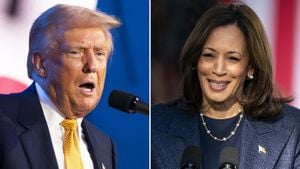After months of speculation, the 2024 presidential election has concluded, marking the return of Donald Trump as the 47th President of the United States. Trump’s victory over Democratic challenger Kamala Harris came as he swept numerous battleground states, solidifying his position with 295 electoral votes. The results not only quashed Harris’s hopes of becoming the first female president but also heralded the possibilities for Trump to enact significant changes during his second term, particularly as Republicans gained control of the Senate.
Former President Trump celebrated his election victory with exuberance, declaring it the product of what he described as "the greatest political movement of all time." The jubilance at his election night party held in West Palm Beach, Florida, painted a starkly different picture than what many had predicted. Trump’s supporters reveled as results rolled in, particularly when Wisconsin’s final outcome pushed him past the necessary 270 electoral votes to claim the presidency.
Meanwhile, Harris expressed graciousness and determination during her concession speech delivered at Howard University. "I will keep fighting for freedom, opportunity, fairness, and dignity of all people—ideals at the heart of this nation," she asserted, reinforcing her commitment to the causes of her campaign, even as she stepped back from the race. Harris's loss, especially after her prior predictions of success, raised questions about the Democratic Party's missteps, particularly their failure to adequately address voter sentiment and strategies, leading to their disappointing performance.
The immediate aftermath of the election has revealed several intriguing dynamics. For one, Republican leaders have begun to revise their previous stances on early voting—a practice Trump and his party had long been skeptical of. Ronna McDaniel, former Republican National Committee Chair, emphasized the need for early voting to be the norm moving forward. This pivot indicates how pivotal early voting became to Trump's victory, driving many to reconsider their previous skepticism about the process.
Notably, Trump’s election win has also drawn significant attention from foreign leaders, including Russian President Vladimir Putin, who congratulated him. Such congratulations reflect the broader geopolitical ramifications of Trump’s victory, potentially altering U.S. relations with various nations significantly.
Trump’s win also reignited discussions about voter coalitions within the Democratic and Republican parties. Analysts observed increases in support for Trump among Latinos and Black voters—trends well-illustrated by his increased performance across traditionally Democratic strongholds, including some unexpected wins in Massachusetts and New Jersey. Trump's ability to connect with these groups shattered the anticipated solid support seen for Democrats and revealed deep fractures within the party.
Political experts have pointed out the glaring mistakes made by the Democratic Party, particularly their decision to nominate Harris as the successor to President Biden without considering alternative candidates. Analysts suggested missed opportunities for Democrats to cultivate fresh leadership and broader coalitions to avoid being pigeonholed as solely elite-focused.
Sociopolitical analysts examining polling discrepancies noted systematic errors similar to those seen during elections past. Frances E. Lee, Professor of Politics and Public Affairs, pointed out how pollster biases may have misrepresented Trump’s support, which often remains underreported due to the difficulty pollsters have reaching his voter base.
Internal Republican dynamics indicate Trump is choosing not only seasoned advisors but also allies who were pivotal during his previous campaigns. The appointment of Susie Wiles as the first female Chief of Staff reflects both strategic political signaling and the consolidation of influence among loyalists from his 2016 and 2020 campaigns, ensuring continuity as he rolls out his agenda.
Looking forward, professors and political strategists are debating the potential consequences of Trump’s second administration. Without the pressure of seeking re-election, some speculate he may pursue more radical policies, particularly outlined within the controversial "Project 2025," which has raised alarms among critics who warn of potential erosions of democratic norms and guidelines governing civil discourse and safety.
Across the board, the fallout from the election raises questions not just for the future of Democrats but also for the integrity of the party system. While Democrats need to rethink their strategies and broaden their base, Republicans now face the challenge of not only uniting their party but also reconciling with the broader electorate’s expectations. The struggle for both parties to adapt will be key to their future viability, especially as the U.S. moves toward yet another election season.
While Trump celebrates his return to the White House, the divide and subsequent political maneuvering of both parties signal the continuing complexity of American politics. Over the coming months, how both Trump and Harris navigate their defined roles will shape dialogues surrounding policies and public sentiment, potentially setting the stage for a rapidly approaching 2026 midterm election.
With all eyes now on the Capitol and the White House, the American political narrative continues to evolve, captivating the nation as citizens watch closely what lies on the horizon.



